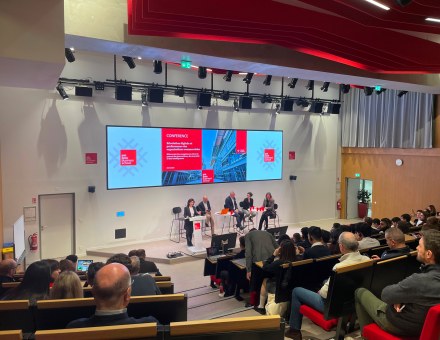On January 9, 2025, emlyon business school hosted a roundtable discussion titled "Digital Revolution and the Performance of Commercial Organizations: Rethinking Competencies in the Battle for Innovation, Markets, and Intelligence." Held on the Lyon campus, the event featured keynote speaker Joël Le Bon, alongside Kimia Ferdows, Céline Brognaux, and Jan Malmborg.
The discussion focused on the critical challenges posed by the digitalization of commercial functions. The digital revolution is profoundly transforming the performance of commercial organizations, forcing businesses to reevaluate their competencies to stay competitive. This transformation is accompanied by fierce competition in innovation, adapting to new markets, and leveraging intelligence—both human and artificial—to differentiate and succeed.
The event was opened by Marie-Christine Collière, Director of the Master of Science in Global Sales Excellence program, and concluded by Roland Claverie, Associate Dean of Master and Master of Science Programs at emlyon business school.
This conference brought together both vision and practical experience—two essential elements that shape the role of sales professionals in today's companies.
Sales professionals have a transformative role within organizations: they not only craft the customer experience but also shape corporate strategy by bringing critical insights from the field. This allows them to redefine approaches to revenue growth and customer relationship management. Roland Claverie
Renowned Experts Share Their Insights
The roundtable was moderated by Dr. Joël Le Bon, Professor of Marketing & Sales and Executive Director of the Digital Business Initiative at Johns Hopkins University, who also served as the keynote speaker. Joining him were esteemed speakers who contributed diverse perspectives on the challenges of digital transformation in commercial functions: * Kimia Ferdows, Ph.D., Deputy CEO of InProcess by Sopra Steria Next. * Céline Brognaux, Partner, Customer & Value Practice at Sopra Steria Next, and an emlyon business school alumna. * Jan Malmborg, Global Sales Director at Dassault Systèmes 3DS and Trade Advisor for Sweden's Foreign Trade Ministry.
Both Joël Le Bon and Jan Malmborg also play active roles in emlyon's MSc in Global Sales Excellence program, where they teach and share their expertise, equipping students with critical sales management competencies.
Digitalization of Sales: A Rapid and Complex Shift
The digitalization of sales has significantly accelerated in recent years, largely driven by the COVID-19 pandemic. However, many companies still struggle to effectively structure this transformation. As Joël Le Bon explained: "sales is a challenge for everyone, but it's less so for those who truly understand it."
He also pointed out a common paradox: while the necessary technologies are available, their adoption remains a major challenge. This is often due to the complexity of organizational ecosystems and the gap between the technological tools available and the skills required to use them effectively.
Launch of the MSc in Global Sales Excellence: a program addressing key challenges
The redefinition and mastery of essential skills in sales represent a major challenge. To address this, emlyon business school launched an innovative program in September 2024: the MSc in Global Sales Excellence, designed to meet the evolving needs of businesses. During the roundtable, emlyon presented the program to participating companies, emphasizing how future graduates will be equipped to tackle today's market challenges. The program aims to develop strategic leaders capable of managing complex projects in a globalized and digital world. These graduates will be equipped with both technical expertise (hard skills) and interpersonal capabilities (soft skills).
"About one-third of the skills required by 2025 are not currently reflected in job descriptions." (Source : Gartner, 2024)
This program also delves deeply into six critical pillars of sales digital transformation, as identified by experts. These pillars address both the organizational level—human resources, structures and processes, and technologies—and the individual level, focusing on Mindset (values and mindset), Skillset (competencies and expertise), and Techset (technological tools).
Sales Enablement, a vital function today, is at the core of the program. It emphasizes optimizing commercial performance by equipping sales teams with the tools, resources, and training necessary to streamline their work, enhance efficiency, and support business strategies.
The evolution of sales competencies
Jan Malmborg enriched the discussion by sharing insights from a study conducted by Dassault Systèmes involving 500 sales professionals. The study highlighted key competencies, including leadership, effective communication, understanding stakeholders at all levels of the hierarchy, the ability to guide clients' business transformations, and change management.
Sales is change management—it follows the same steps.
Jan Malmborg, Global Sales Director, Dassault Systèmes 3DS
Artificial intelligence and sales: a tool, not a threat
The topic of artificial intelligence (AI) was critically examined. While AI has the potential to enhance sales efficiency, it also raises concerns among sales teams, particularly the fear that human skills might become obsolete. However, the experts' analysis emphasized that AI should not be seen as a threat but as an opportunity. AI should be viewed as a tool to free sales teams from repetitive and time-consuming tasks. By optimizing these processes, AI allows human efforts to focus on higher-value tasks, such as strategic client engagement, anticipating their needs, and solving complex issues. In short, AI should not replace human skills but rather complement and amplify them.
An effective sales strategy relies on optimized customer data management. The data feeds AI, which personalizes sales approaches and anticipates customer needs. Effective data management generates valuable insights, providing a competitive advantage by enabling faster and more targeted responses.
The era of the lone salesperson will give way to an era of collaborative artificial intelligence, where the synergy between humans and AI will enhance client relationships and boost performance.
Céline Brognaux, Partner, Customer & Value Practice at Sopra Steria Next, highlighted the importance of collaborative tools (both internally and externally with clients) to simplify processes and free up time for higher-value activities. Salespeople are often the "single point of contact," heavily solicited by clients, and tasked with managing responsibilities beyond their scope—such as reporting, product quality, and incident management—while also acting as a liaison with other departments within the company. Technology helps mitigate organizational complexities, lightening the load for sales teams and allowing them to focus on their core responsibilities.
Customer, sales & revenue enablement: optimizing sales performance

The concept of sales enablement aims to equip sales teams with the tools, resources, and training necessary to maximize their performance. By integrating advanced technologies such as Salesforce or Sales Navigator and centralizing customer data, it enables salespeople to personalize their interactions and focus on strategic tasks.
Customer enablement, on the other hand, seeks to empower clients by providing them with the tools and resources they need to optimize their experience and success with a product or service. This includes solutions like self-service portals, tutorials, and support systems that allow clients to resolve issues quickly while strengthening their relationship with the company.
Revenue enablement encompasses the strategies, tools, processes, and training designed to align sales, marketing, customer service, and other key functions around a shared goal: maximizing company revenue. Organizations adopting this approach not only improve internal performance but also strengthen their ability to deliver a consistent and seamless customer experience.
As Joël Le Bon emphasized, "There's no sales enablement without revenue enablement." Indeed, efforts to support sales teams must align with a broader revenue-maximization strategy involving all company functions (sales, marketing, customer service, etc.). Revenue enablement ensures consistent collaboration across teams, thereby enhancing the effectiveness of Sales Enablement and optimizing revenue opportunities.
Observing to innovate: putting humans at the heart of strategy
One of the key takeaways from the roundtable discussion was the importance of observing customer behaviors to better understand their expectations and anticipate market shifts, through a "human-centric" approach.
You need to place humans at the center of your thinking. Humans are your clients, but they are also users, buyers, employees, subcontractors, partners, and potentially even your neighbors. Your client embodies all these facets. How do you address them? How does your product integrate into your client's life? What motivations does it respond to—whether professional or personal? The techniques from human and social sciences help answer these questions. They are particularly valuable for sales roles. Salespeople are true assets in this approach because they are on the ground: they serve as the bridge between the company and the client's life.
Kimia Ferdows, Ph.D. in Human Sciences and Deputy Managing Director of InProcess by Sopra Steria Next.
Innovation in sales does not solely lie in adopting new technologies but also in deeply understanding customer behaviors and expectations. For instance, Kimia Ferdows shared the example of Decathlon: by observing that over 50% of its customers are not athletes but parents looking for equipment for their children or everyday needs, the company reorganized its aisles and developed solutions better tailored to these new expectations. This highlights the importance of going beyond simply selling products to uncover the true motivations behind purchases.
Companies that integrate human observation at the heart of their strategies are better equipped to anticipate market changes and co-create meaningful solutions with their customers.
Understanding compromise: the key to sales success

Sales and purchasing processes are becoming increasingly complex and extended, due to fragmented decision-making centers and the multiplicity of stakeholders. In this context, a salesperson must be capable of understanding the client's reasoning.
Unlike a purely product-focused perspective, clients do not solely purchase a technical solution. Instead, they seek a compromise that balances their needs, constraints, aspirations, and the available solutions on the market.
Commercial organizations often focus on the features and benefits of their products or services, which are frequently already known to the client. The challenge for sales teams lies in their ability to decode the unique compromise each client is trying to achieve.
"Customer satisfaction and loyalty hide the silence of a compromise"
Joël Le Bon
The discussions during this roundtable highlighted the growing complexity of commercial organizations, where the multiplicity of stakeholders and data management add new challenges. Far from replacing humans, artificial intelligence must complement them to better understand customer expectations and optimize processes. Companies that manage to combine technology and human skills to align their teams and navigate this complexity will be better positioned for success in a digitalized environment.


